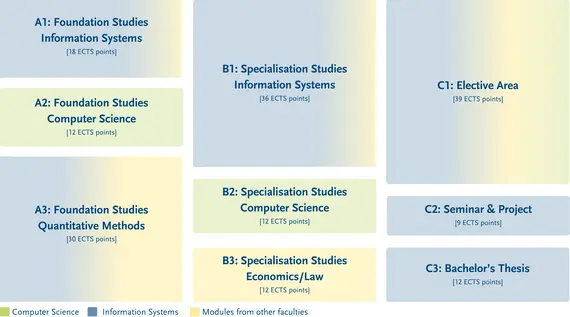Structure and Curriculum
The Information Systems module group consists of the mo-dules Introduction to Business Administration, Introduction into Information Systems, and Development & Operation of Application Systems.
In module group A2, fundamental knowledge of theoretical and practical computer science is taught. In particular, students receive an introduction to computer science and learn concepts of programming.
This module group teaches mathematical foundations, which form the basis of important quantitative methods in business informatics.
Exemplary module selection options:
- Discrete modelling
- Mathematics for Economics & Business I
- Mathematics for Economics & Business II
- Statistics & Data Science
This module group imparts knowledge in the core area of information systems, e.g. business information and application systems, information and knowledge management. Students also learn the fundamentals of project management and the modelling of information systems.
Exemplary module selection options:
- International IT Project Management
- IT-Controlling
- Scientific Research in Information Systems
- Digital Business
- Bookkeeping
- Knowledge- & Informationmanagement
In this module group, the students' knowledge of computer science is expanded. In particular, students gain insights into algorithms, data structures, and database systems.
Module group B3 is concerned with foundations of business administration, paired with selected topics of economics and law.
C1: Elective Area
Individual interests can be pursued in this module group, and foreign languages, key competences, or a guided study abroad programme are also possible.
Exemplary module selection options:
- AI Engineering in Companies
- Introduction to Digital Work
- Fundamentals of Energy Informatics
- Principles and Trends of Digital Technologies
- Digital Privacy
- Modeling of Business Information Systems
- Advanced Java Programming
- Accounting in Accordance with the German Commercial Code
- Introduction to Innovation Management
Module group C2 comprises a seminar and a project. In seminars, specific topics from the areas discussed in module groups A1 — B3 are covered. Furthermore, one information systems project has to be undertaken. It lets students transfer their theoretical knowledge to a practical application.
The C3 module group serves as the framework for independent work on a topic from either the Information Systems subject group, or on information-systems-relevant topics from the Computer Science, Applied Computer Science, and Business Administration and Management groups
Continue to Admission and Enrolment.
